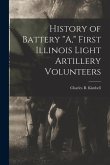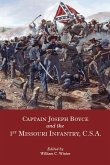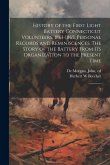Originally published in 1890 by the Civil War veterans of the regiment, this new modern version includes the entire original text, 58 images, and an index. The author, Frank S. Reader, a member of Company I, was a newspaper editor and proprietor. His wartime experience as a clerk to both generals Averell and Sigel, as well as his newspaper background, served him well when he was asked by his regimental comrades to write and publish the history of their unit. Chapters: Chapter I: Loyal Western Virginia Chapter II: Organization of the Regiment Chapter III: Company Histories and Rosters Chapter IV: The Quartermaster's Department Chapter V: The Chaplain and His Work Chapter VI: In Camp At Beverly, 1861 Chapter VII: Relief Of Cheat Mountain Chapter VIII: In Camp At Elkwater Chapter IX: Camp At Cheat Mountain Summit Chapter X: Mountain Department Chapter XI: The Army Of Virginia Chapter XII: Return To Western Virginia Chapter XIII: Fourth Separate Brigade Chapter XIV: Rocky Gap Expedition Chapter XV: Droop Mountain Chapter XVI: The Salem Raid Chapter XVII: Campaigns Of 1864 Chapter XVIII: Scouting Service Chapter XIX: Prison Life Chapter XX: Escape From Prison Index Excerpt: Droop Mountain, Pocahontas County, West Virginia November 6, 1863 On arriving at the foot of the hill where the Confederates were posted, the Second (later the 5th West Virginia Cavalry) passed the Eighth Virginia, leaving them on our left, moving on for the purpose of ascertaining the position of the Third Virginia. Col. Scott was then ordered to begin his advance up the hill toward the enemy's works, which he did through briers, tree tops and obstacles of various kinds... When our line was within ten or fifteen yards of the crest of the mountain, the enemy opened upon us, and a sheet of flame issued from the mountain top, as the Confederates poured a terrific fire of musketry into the faces of our brave boys. The whole line was then pushed forward with vigor, and never flinched or wavered, but advanced with the tread of veterans and returned the fire with telling effect. The fighting was fierce and terrible, a battle to the death, the musketry fire being very rapid. We had one advantage, that as we advanced up the steep mountain, the fire of the enemy passed over our heads, and thus saved our line from being mowed down. Steadily our men advanced, driving their foe from the breastworks of fence rails, logs and stones, that they had hastily thrown up... After about two hours of fighting the Second and Third Virginia, with yells and cheers, loud and strong, charged into the jaws of death and fire, and carried the position by storm, driving the enemy like chaff before the wind, who retreated precipitately toward Lewisburg.
Hinweis: Dieser Artikel kann nur an eine deutsche Lieferadresse ausgeliefert werden.
Hinweis: Dieser Artikel kann nur an eine deutsche Lieferadresse ausgeliefert werden.

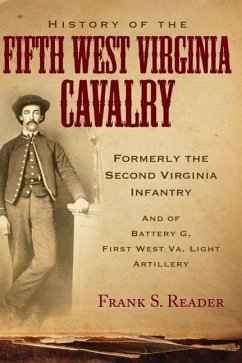
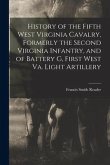
![Report Of Proceedings Of The ... Reunion[s] ...: Second Regiment Ohio Cavalry Twenty-fifth Battery Ohio Artillery Report Of Proceedings Of The ... Reunion[s] ...: Second Regiment Ohio Cavalry Twenty-fifth Battery Ohio Artillery](https://bilder.buecher.de/produkte/71/71630/71630825m.jpg)
